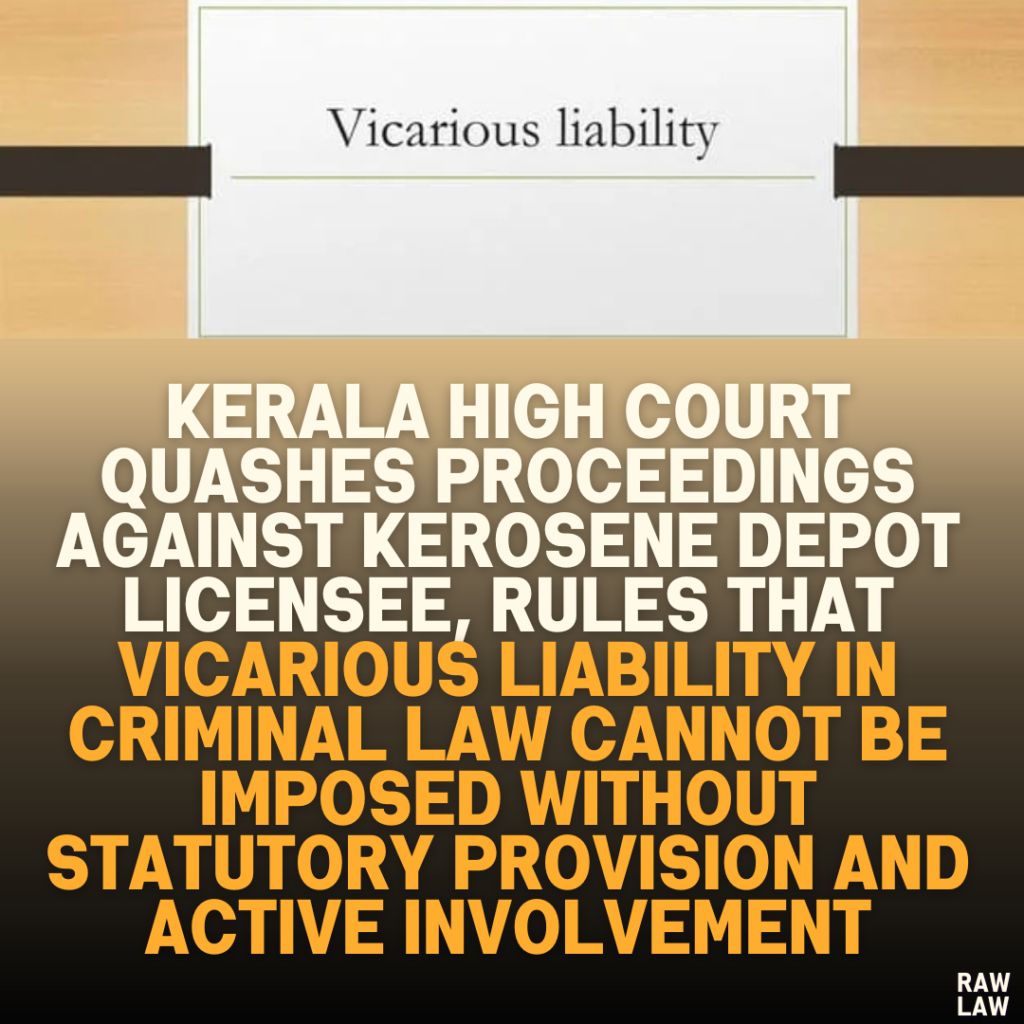Court’s Decision
The Kerala High Court quashed the criminal proceedings against the petitioner, the 4th accused in a case related to the diversion of kerosene from a government supply. The court observed that the petitioner had no direct involvement or criminal intent in the alleged diversion. It noted that the prosecution’s attempt to impose vicarious liability on the petitioner was legally unsustainable. The decision ensures that legal liability cannot be imposed on individuals based solely on their designation or position unless supported by specific statutory provisions.
Facts
- Incident: The case arose from a police investigation into the alleged illegal diversion of kerosene meant for authorized distribution. A tanker lorry was intercepted, and it was alleged that the kerosene was being taken to an unauthorized destination.
- Petitioner’s Role: The petitioner was implicated as the licensee of the depot from which the kerosene was allegedly diverted. However, the depot was under the operational control of staff and relatives of the deceased previous licensee.
- Government Inquiry: A government inquiry exonerated the petitioner, concluding that the alleged diversion resulted from the actions of depot staff rather than the petitioner. The petitioner’s license had been reinstated following this inquiry.
Issues
- Vicarious Liability: Could the petitioner, as a depot licensee, be held vicariously liable for the actions of the depot staff in a criminal proceeding?
- Abuse of Process: Did the continuation of the prosecution against the petitioner amount to an abuse of the judicial process?
Petitioner’s Arguments
- No Direct Control: The petitioner contended that he had no operational control over the depot during the incident and that the alleged diversion was carried out by the depot’s staff.
- Government Findings: The petitioner relied on a government inquiry report (Annexure VI) that absolved him of active involvement in the alleged diversion.
- Legal Principle: He argued that criminal law does not recognize vicarious liability unless explicitly stated in the statute. His mere status as a licensee could not be the basis for prosecution without evidence of direct involvement or intent.
Respondent’s Arguments
The prosecution argued that the petitioner’s contentions should be addressed during the trial. It maintained that the trial court was the appropriate forum for examining the facts and determining the petitioner’s culpability.
Analysis of the Law
The court analyzed the legal principles surrounding vicarious liability in criminal law:
- Statutory Requirement: Vicarious liability is not recognized in criminal law unless explicitly provided by statute.
- Mens Rea: Liability in criminal law requires mens rea (criminal intent). Merely being the licensee or director of an entity does not automatically establish culpability.
- Individual Involvement: Active involvement or specific allegations must be proven to attribute liability.
Precedent Analysis
The court relied on the principles established in Ashok Kumaran @ Sabu C. v. State of Kerala [2023 (4) KHC 545], where the Kerala High Court emphasized that criminal liability cannot be imputed vicariously unless a statute explicitly provides for it. This precedent provided clarity on the scope of vicarious liability in criminal jurisprudence.
Court’s Reasoning
- Government Inquiry: The court examined the government’s findings, which clearly indicated that the petitioner had no direct role in the alleged diversion and that the incident occurred due to the actions of the depot staff.
- Lack of Mens Rea: The court found no evidence of criminal intent or active involvement on the petitioner’s part.
- Principle of Vicarious Liability: It reiterated that vicarious liability is not recognized in criminal law unless explicitly provided by statute.
- Abuse of Process: Continuing the prosecution against the petitioner was deemed an abuse of the judicial process, given the lack of evidence supporting the charges.
The court held:
“The prosecution is now attributing vicarious liability to the petitioner. Vicarious liability is unknown in criminal law.”
Conclusion
The court quashed the proceedings against the petitioner in the case while allowing the trial to proceed against the other accused. It clarified that the decision was limited to the petitioner and would not affect the case against the remaining accused.
Implications
- Legal Precedent: This judgment reinforces the principle that criminal liability requires proof of mens rea or direct involvement. It sets a precedent for the treatment of vicarious liability in criminal cases.
- Protection of Individuals: The decision protects individuals from being prosecuted solely based on their position or designation unless specific statutory provisions impose liability.
- Judicial Economy: By quashing baseless prosecutions, the court ensures judicial resources are focused on cases with substantial evidence.
This judgment has significant implications for cases involving corporate and organizational liability, emphasizing the necessity of clear evidence of individual involvement or statutory provisions for vicarious liability.



